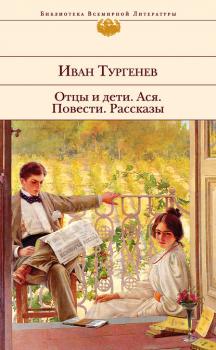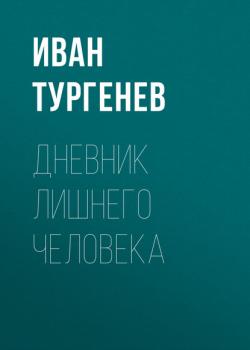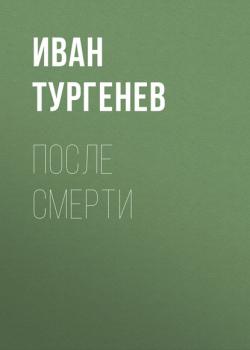ТОП просматриваемых книг сайта:
Иван Тургенев
Список книг автора Иван ТургеневАннотация
Рецензия Тургенева на перевод «Вильгельма Телля» содержит характерные для демократической критики начала 1840-х годов суждения о «германском духе» и о творчестве Шиллера как отражении немецкого национального сознания. «Вильгельм Телль», по словам Тургенева, «не драма, а драматическое представление, – драматического элемента именно и недостает в немцах». Это очень близко к словам Белинского в статье «Русский театр в Петербурге»: «…у немцев нет ни драмы, ни романа <…> В этом случае должно исключить одного Шиллера…»
Аннотация
«…Небольшое село Колотовка, принадлежавшее некогда помещице, за лихой и бойкий нрав прозванной в околотке Стрыганихой (настоящее имя ее осталось неизвестным), а ныне состоящее за каким-то петербургским немцем, лежит на скате голого холма, сверху донизу рассеченного страшным оврагом, который, зияя как бездна, вьется, разрытый и размытый по самой середине улицы и пуще реки, – через реку можно по крайней мере навести мост – разделяет обе стороны бедной деревушки…»
Аннотация
Литературно-критические выступления Тургенева, как правило, были тесно связаны с его собственным художественным творчеством. В данном случае активный интерес к новому сборнику произведений Даля был вызван у Тургенева тем, что он сам в это время работал над «Хорем и Калинычем» – первым очерком из «Записок охотника», главным героем которых стал русский крестьянин. Настоящая рецензия и очерк «Хорь и Калиныч» вышли в свет одновременно, в первых номерах «Отечественных записок» и «Современника». Не случайно поэтому, что в рецензии Тургенев уделил большое внимание проблеме народности литературы и истолковал ее с точки зрения тех задач, которые он ставил перед собою как автор очерков из крестьянской жизни.
Аннотация
«Был прекрасный июльский день, один из тех дней, которые случаются только тогда, когда погода установилась надолго. С самого раннего утра небо ясно; утренняя заря не пылает пожаром: она разливается кротким румянцем. Солнце – не огнистое, не раскаленное, как во время знойной засухи, не тускло-багровое, как перед бурей, но светлое и приветно лучезарное – мирно всплывает под узкой и длинной тучкой, свежо просияет и погрузится в лиловый ее туман…»
Аннотация
Проза И.С. Тургенева, пожалуй, самая изысканная в русской классической литературе, живописная, стилистически безупречная. Как психологически верны, живы его характеры, какими минимальными средствами писатель достигает такой невероятной художественной изобразительности. И вечный конфликт отцов и детей выписан блестяще. Как точно писатель чувствует историческую ситуацию, те тенденции, которые зреют в обществе. Не случайно романы И. Тургенева и в России и за рубежом воспринимались как художественный комментарий к русским революционным событиям пореформенной России.
В книгу включены знаменитые произведения И. Тургенева о любви, ведь «только любовью держится и движется жизнь», о лишнем человеке, а также мистические произведения писателя, не менее значимые для его творческого пути, но значительно менее растиражированные. Всеми важными открытиями Иван Тургенев щедро делится с читателем в своих произведениях.
Предваряет книгу вступительное слово Дмитрия Быкова, в основу которого положена лекция, прочитанная к 200-летию со дня рождения писателя, расшифрованная и подготовленная к изданию специально для этой книги. В ней представлен оригинальный взгляд на творчество Ивана Тургенева – самого европейского русского писателя XIX века.
Аннотация
«Доктор сейчас уехал от меня. Наконец добился я толку! Как он ни хитрил, а не мог не высказаться наконец. Да, я скоро, очень скоро умру. Реки вскроются, и я с последним снегом, вероятно, уплыву… куда? бог весть! Тоже в море. Ну, что ж! коли умирать, так умирать весной. Но не смешно ли начинать свой дневник, может быть, за две недели до смерти? Что за беда? И чем четырнадцать дней менее четырнадцати лет, четырнадцати столетий? Перед вечностью, говорят, всё пустяки – да; но в таком случае и сама вечность – пустяки…»
Аннотация
«Весной 1878 года проживал в Москве, в небольшом деревянном домике на Шаболовке, молодой человек, лет двадцати пяти, по имени Яков Аратов. С ним проживала его тетка, старая девица, лет пятидесяти с лишком, сестра его отца, Платонида Ивановна. Она заведовала его хозяйством и вела его расходы, на что Аратов совершенно не был способен. Других родных у него не было. Несколько лет тому назад отец его, небогатый дворянчик Т…й губернии, переехал в Москву вместе с ним и Платонидой Ивановной, которую, впрочем, всегда звал Платошей…»
Аннотация
«Был прекрасный июльский день, один из тех дней, которые случаются только тогда, когда погода установилась надолго. С самого раннего утра небо ясно; утренняя заря не пылает пожаром: она разливается кротким румянцем. Солнце – не огнистое, не раскаленное, как во время знойной засухи, не тускло-багровое, как перед бурей, но светлое и приветно лучезарное – мирно всплывает под узкой и длинной тучкой, свежо просияет и погрузится в лиловый ее туман…»










